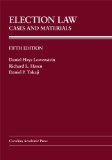With political officeholders deciding issues about voter access, redistricting, and campaign finance, the interests of the voting public are subject to conflicts of interest that imperil the integrity of the election process. Perhaps it is time for citizen panelsinstead of elected officials to determine election law. Outdated laws governing elections also need revision. The ABA Journal reports on legal questions about ballots cast in an era that relies on new technology. Taking a photo of a filled-in ballot from a smartphone violates the law of some states, even constituting a felony. A post by NBC News discusses “election law” with possible social media aspects with an article about tweeting a photo of a ballot, showing it on Instagram, Facebook, or on other sites with a potential for prosecution. Kay Stimson, Communications & Special Projects Director of the National Association of Secretaries of State, a professional organization for secretaries of states around the country, told NBC News, that the issue is not just about photographing ballots but about displaying them.
 On this subject, Brooklyn Law School Library has the new 5th edition of Election Law: Cases and Materials which covers developments in election law in the 2012 election season including; extensive coverage of Citizens United, super PACs, and other campaign finance developments; emerging issues in voting rights and redistricting, including coverage of the Texas redistricting and voter identification cases; and new coverage of issues in judicial elections. With perspectives from law and political science, the book is a good resource for law and political science courses.
On this subject, Brooklyn Law School Library has the new 5th edition of Election Law: Cases and Materials which covers developments in election law in the 2012 election season including; extensive coverage of Citizens United, super PACs, and other campaign finance developments; emerging issues in voting rights and redistricting, including coverage of the Texas redistricting and voter identification cases; and new coverage of issues in judicial elections. With perspectives from law and political science, the book is a good resource for law and political science courses. 